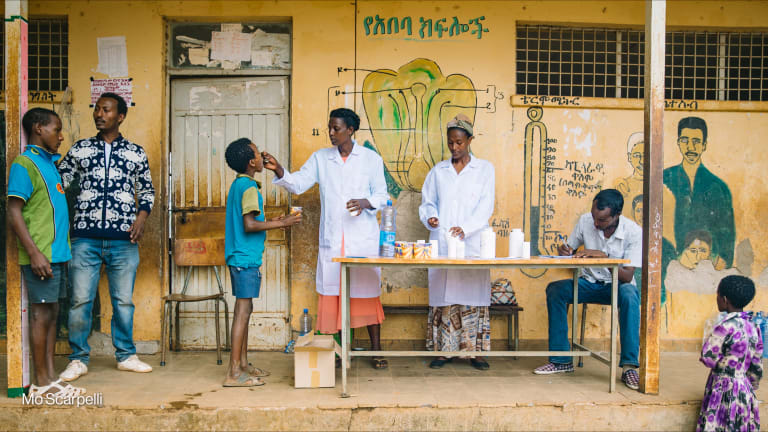On the occasion of the 75th session of the United Nations General Assembly, Devex, in partnership with Seed Global Health, Takeda Pharmaceuticals, World Vision, Japanese Organization for International Cooperation in Family Planning, and Plan International, hosted a virtual event on the importance of investing in a strong health care workforce.
“To cope with COVID-19 we need strong primary health care infrastructure to ensure access and enhanced quality delivery of services,” said Vice President of the Republic of Sierra Leone Mohamed Juldeh Jalloh in an opening statement.
Jalloh also highlighted that despite having a lot of primary health care centers, his country remains understaffed as the majority of health care workers are concentrated in urban areas, creating challenges of health workforce distribution.
“If we want to succeed in any future pandemics or outbreaks like Ebola, we need to strengthen our health care systems within the framework of health for all,” he said, adding that the most important lesson from Ebola and COVID-19 has been the need to move from response to building resilience building.
The current pandemic has revealed a disconnect between the private and public sector, and the importance of investing in the public sector to ensure responsive health systems that are accessible to everyone, said Dr. Luis Gadama, chief of the obstetrics and gynecology department at Malawi College of Medicine, during a panel conversation.
Joined by health care professionals from India and Kenya, there was consensus around the urgent need for increased investments in health systems and in the health care workforce.
“The pandemic has exposed how fragile our health systems are,” Gadama said. “There should be an investment in the public health care system and making sure that it’s sustainable on its own.”
Jill Adhiambo Mattakwa, Kenya country manager at JOICFP, shared some of her daily challenges. Working at both the facility- and community-level she experiences frequent issues of understaffing, commodity stockouts, and the lack of equipment and community health care workers.
COVID-19 has exasperated all these issues, she said. “As much as we have health facilities that are strong, they’re not prepared to deal with the increased influx of patients,” she added. To manage the pandemic response, JOICFP had to quickly recruit more staff on a short-term basis.
We realized that community health volunteers play an important role in prevention by spreading awareness and information to the community, she said. But it was challenging to ensure they had enough personal protective equipment to protect themselves when they went out to the communities to teach them about hand-washing and using masks.
Watch the event to learn more about the need to support frontline health care workers to build resilient health systems and future pandemic preparedness, and join the conversation online using the hashtags #HealthForAll and #DevexEvent.








